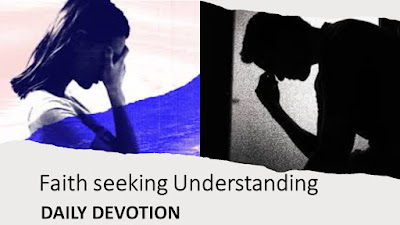AUGUST 22, 2022
Above is a video of Psalm 22 from our Good Friday service in 2021 if you would like to listen to a reading of this Psalm.
Psalm 22
For the director of music.
To the tune of “The Doe of the Morning.”
A psalm of David.
1 My God, my God, why have you forsaken me?
Why are you so far from saving me,
so far from my cries of anguish?
2 My God, I cry out by day, but you do not answer,
by night, but I find no rest.
3 Yet you are enthroned as the Holy One;
you are the one Israel praises.
4 In you our ancestors put their trust;
they trusted and you delivered them.
5 To you they cried out and were saved;
in you they trusted and were not put to shame.
6 But I am a worm and not a man,
scorned by everyone, despised by the people.
7 All who see me mock me;
they hurl insults, shaking their heads.
8 “He trusts in the Lord,” they say,
“let the Lord rescue him.
Let him deliver him,
since he delights in him.”
9 Yet you brought me out of the womb;
you made me trust in you, even at my mother’s breast.
10 From birth I was cast on you;
from my mother’s womb you have been my God.
11 Do not be far from me,
for trouble is near
and there is no one to help.
12 Many bulls surround me;
strong bulls of Bashan encircle me.
13 Roaring lions that tear their prey
open their mouths wide against me.
14 I am poured out like water,
and all my bones are out of joint.
My heart has turned to wax;
it has melted within me.
15 My mouth is dried up like a potsherd,
and my tongue sticks to the roof of my mouth;
you lay me in the dust of death.
16 Dogs surround me,
a pack of villains encircles me;
they pierce my hands and my feet.
17 All my bones are on display;
people stare and gloat over me.
18 They divide my clothes among them
and cast lots for my garment.
19 But you, Lord, do not be far from me.
You are my strength; come quickly to help me.
20 Deliver me from the sword,
my precious life from the power of the dogs.
21 Rescue me from the mouth of the lions;
save me from the horns of the wild oxen.
22 I will declare your name to my people;
in the assembly I will praise you.
23 You who fear the Lord, praise him!
All you descendants of Jacob, honor him!
Revere him, all you descendants of Israel!
24 For he has not despised or scorned
the suffering of the afflicted one;
he has not hidden his face from him
but has listened to his cry for help.
25 From you comes the theme of my praise in the great assembly;
before those who fear you I will fulfill my vows.
26 The poor will eat and be satisfied;
those who seek the Lord will praise him—
may your hearts live forever!
27 All the ends of the earth
will remember and turn to the Lord,
and all the families of the nations
will bow down before him,
28 for dominion belongs to the Lord
and he rules over the nations.
29 All the rich of the earth will feast and worship;
all who go down to the dust will kneel before him—
those who cannot keep themselves alive.
30 Posterity will serve him;
future generations will be told about the Lord.
31 They will proclaim his righteousness,
declaring to a people yet unborn:
He has done it!
We need laments because there's so much pain in life, physical pain, emotional pain, spiritual pain. There is my pain, your pain, the pain of fellow worshippers, and the pain of a world. This pain is often complicated by the fact that the pain can linger for weeks or months, or, as in Paul's experience of the thorn in the flesh pain can last a lifetime. We pray, but the prayers seem to go nowhere, feels like no one's listening, in these moments we feel abandoned, alone, and doubts begin to seep in or rise.
The characters in the Bible lived in a painful world just like we do. The scriptures are filled with expressions of anger, doubt, exasperation, fear, frustration, and pain. The reality is that we all have these seasons of hard times, and we journey from Suffering toward Praise in a journey that I like call Faith Seeking Understanding. Prayers of Lament can help us on that road. Prayers of Lament lead us into honest and open prayers through which we find help, healing and hope.
In our talk on Sunday we said that Lament is a prayer in pain that leads to trust. It is not only how Christians grieve; it’s the way Christians praise God through their sorrows. Lament is a pathway to praise when life gets hard.
I thought perhaps a place to begin our week is to recall the Lament that Jesus prayed from the Cross. Those words from Psalm 22. Words that were part of the worship of God’s people, words that were not only prayed but sung. Notice the inscription For the director of music. To the tune of “The Doe of the Morning.”
My view is that if Jesus Lamented, and God’s people in the Old Testament lamented, then it must be a good practice to implement in my spiritual practices, and yours too.
This example uses Psalm 22 to illustrate each of the elements of a Psalm of lament: 1) turning to God in prayer, 2) bringing our complaints, 3) asking boldly, and 4) choosing to trust (or praise).
Let’s look at the structure of the Psalm 22 Lament.
Turn to God
“My God, my God” (v. 1).
Complaint
“Why have you forsaken me? Why are you so far from saving me, so far from the words of my groaning? My God, I cry out by day, but you do not answer, by night, but I find no rest. . . . My mouth is dried up like a potsherd, and my tongue sticks to the roof of my mouth; you lay me in the dust of death” (vv. 1-2, 15).
Ask Boldly
“Lord, do not be far from me. . . . Come quickly to help me. Deliver me from the sword, my precious life from the power of the dogs. Rescue me from the mouth of the lions; save me from the horns of the wild oxen” (vv. 19-21).
Expression of trust
“Yet you are enthroned as the Holy One; you are the praise of Israel. In you our ancestors put their trust; they trusted and you delivered them. . . . Yet you brought me out of the womb; you made me feel secure on my mother’s breast. . . . I will declare your name to my people; in the assembly I will praise you. . . . For he has not despised or scorned the suffering of the afflicted one; he has not hidden his face from him but has listened to his cry for help” (vv. 3-4, 9, 22, 24).
Take Away
What is the place of Lament in your life? The situation that grieves you deeply, or angers you, or overwhelms you with frustration, disappointment and pain.
Now I invite you to write your own prayer of Lament using the headings we have noted.
1) turning to God in prayer
2) bringing our complaints
3) asking boldly
4) choosing to trust (or praise)















